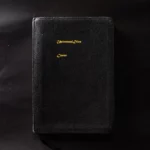Trevor Drury’s EP “Alice, It’s All In Your Head”
Trevor Drury’s EP “Alice, It’s All In Your Head” plays in the background, but not in a soft, unobtrusive way. It’s crawling up the walls, pushing through the cracks in the windows, filling the room like heavy fog. The city outside—whether it’s Boston, London, or New York—feels distant, almost irrelevant. The only thing that matters right now is the piano, the lyrics, and the strange, almost obsessive pull of Drury’s voice, a magnetic force somewhere between a whisper and a confession.
I get the impression Drury isn’t interested in your happiness. That’s clear. Alice doesn’t care if you’re comfortable, doesn’t ask if you’re ready for the next chord change, the next evocative lyric that hits like a punch to the chest. It’s a claustrophobic experience, like the walls are closing in, and it’s hard to tell if that’s comforting or terrifying. But you can’t stop listening.
Alice isn’t just an EP; it’s a mood, an unraveling. It’s the sound of someone spiraling into themselves, into the corners of their mind that they’d probably rather not visit. But Drury is here, opening every door, flicking on the lights, asking you to follow him in.
There’s a narrative quality to Drury’s music, but not the kind you expect. The first single, Head On The Tracks, premiered in Clash Magazine, but the song feels like it should’ve premiered in some forgotten novel by an existentialist who never really made it out of the Paris scene. It’s all jazz-inflected piano riffs and a dark, alt-pop undercurrent that tugs you in deeper with every listen. You don’t feel uplifted, but you do feel seen, which is probably worse.
The production, handled by Marc Swersky, is sleek, polished, but not overly so. You can hear the rough edges where Drury’s emotions bleed through. There’s a subtle mix by Seth Von Paulus that pulls the listener’s ear in, almost whispering, “Come closer, there’s more here.”
Drury’s music has always been about the human condition. It’s a theme that threads through his earlier work—albums like The Start (2016) and A Year of My Life (2017)—but Alice feels more dangerous. His influences are laid bare—Radiohead’s cold detachment, Imagine Dragons’ anthemic desperation, and maybe even a dash of Elvis’s swagger, because Drury can’t fully shake his past as an international model who’s been the face of Tom Ford, Hermes, Robert Geller. But those things feel distant, too. Just another skin shed along the way to something real.
Each track on Alice feels like a chapter from a dream that’s slipping away the moment you wake. The songs don’t tell stories as much as they evoke them. The way you can’t quite remember the face of someone you loved years ago, but you can remember exactly how they made you feel. It’s all wrapped up in the lingering piano riffs that dance between jazz and indie rock. It’s not a comfortable space to live in, but it’s seductive nonetheless.
“Alice, it’s all in your head,” he sings in the title track, a line that hangs in the air like smoke. It’s a statement that could be comforting or cruel, depending on how you hear it. Drury, of course, doesn’t tell you which. He lets the ambiguity hang there, teasing you, drawing you in.
But maybe that’s what Trevor Drury does best—he writes music that leaves you on the edge of something, just close enough to feel the drop but not quite close enough to fall. It’s a balancing act between light and dark, between the beauty of the piano and the tension of the lyrics.
At 8, he started playing the piano. At SDSU, he left his vocal performance classes, frustrated, slipping away to write his first song, “Shallow,” a track that would become part of The Start. That frustration, that desire to break free from expectation, it’s all over Alice. Drury, now in Boston, still pursuing his degree in Songwriting and Music Production, seems to have captured that tension between who the world wants him to be and who he actually is. And the result is nothing short of hypnotic.
In the end, “Alice, It’s All In Your Head” isn’t really an EP at all. It’s a fever dream, a deep dive into the parts of your psyche you probably don’t want to face alone. But Drury is there, guiding you through it with his piano, his voice, and that subtle, almost sinister, invitation to lose yourself in the music.
And you will.
Michael Rand







